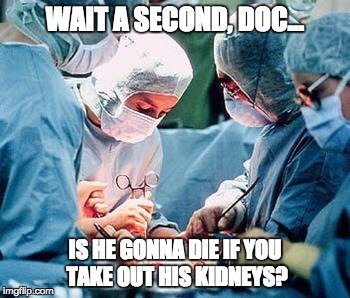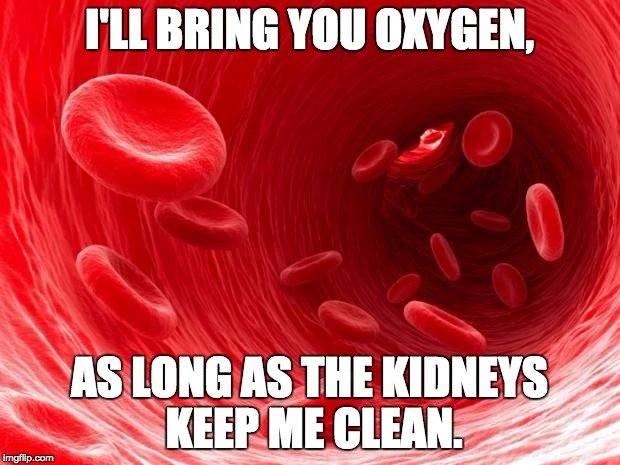Table of Contents (click to expand)
It is possible to live with one kidney, although certain lifestyle changes must be made. It is even possible to survive without any kidneys, but dialysis and intensive treatment would be required for the rest of your life.
The idea of trying to survive without one of your vital organs is a terrifying prospect, but the human body is incredibly resourceful, and can actually keep working even when some of the organs are partially or completely removed. Organs like the heart and the brain are essential, and are necessary to sustain life, but what about some of the other organs, particularly if we have two of them?
We have two kidneys, for example, but what would happen if one had to be removed? Or even both? Can we live without our kidneys?

The Role Of Kidneys In The Human Body
Although many people don’t think about their kidneys, they are some of the hardest-working organs in the body. The kidneys are responsible for filtering more than 120 quarts of blood every single day. The waste products that are filtered out are quickly eliminated by the body in the form of urine, composed of excess salts, fats, toxins and liquid. The ureter is connected to the kidney (one for each organ), and flows down into the bladder, where urine is stored and then eliminated from the body.
Aside from assuring that waste is properly disposed of, kidneys are also critical to the balance of electrolytes in our body. Minerals like sodium, potassium and calcium, among others, help to maintain water balance in the system, as well as optimize nervous system communication. Without the kidneys functioning, or present, the body would not be able to function. The composition of our blood must remain stable, if we are to remain healthy, and the kidneys guarantee that happens.

Furthermore, kidneys produce key hormones that the body requires, such as hormones for strengthening bones, creating new red blood cells and maintaining blood pressure. Clearly, while the kidneys are often overlooked behind major organs like the brain, heart and lungs, they are just as critical to our survival.
Also Read: Excretory System: Organs, Function & Definition
Is It Possible To Live Without Kidneys?
Although kidneys are clearly important for survival, they are not essential, and this is particularly true if only one kidney is present. Some people are born without one of their kidneys, a condition called renal agenesis. Some other people are born with renal dysplasia, in which two kidneys are present, but only one is functional.
While this can be worrying news for any new parent, most people with these conditions can live normal, healthy lives, as their bodies will adapt to the situation. In some instances, people will suffer a small loss of kidney function as they age, but this can take decades. Issues with hypertension are also relatively common in those with only one kidney.
However, the more common reason for only having one kidney is because the other kidney had to be removed. Through a surgical procedure known as a nephrectomy, all or part of a kidney can be removed, and this may be done for a variety of reasons. If you have suffered damage to your kidney, or if it has stopped working properly, you may be eligible for the surgery. Also, if you have cancer of the kidney, or are going to donate your kidney, then a nephrectomy may also be called for.
However, it is important to note that this is a major surgery, and complications can always arise. More advanced forms of a nephrectomy, including a laparascopic option that is less invasive, may also be used in some cases.
As mentioned before, it is possible to live without one kidney, but the removal or loss of both kidneys is a much more deadly situation. When your kidneys stop working, your blood will quickly fill with toxins, which can result in damage to many other organs and impaired functionality. Someone with failed kidneys will require dialysis to survive. Dialysis is a process by which the function of the kidney is taken over by artificial means.
Also Read: Which Internal Organs Can You Survive Without?
Can Dialysis Keep You Alive If Your Kidney(s) Are Removed?
There are two types of dialysis – peritoneal dialysis and hemodialysis. In the former, your blood is actually cleaned inside the body, by injecting a fluid into the abdominal cavity that will absorb waste products in the blood. This liquid can then be removed, along with the toxins. The more intensive and common form is hemodialysis, in which the blood is removed from the body, filtered, and then returned to the body. This process can take hours to complete, and must be done 2-3 times per week.
Depending on the intricacies of your hemodialysis treatment, you may be able to perform it at home, but this often requires more frequent filtering. Essentially, it is possible to live without your kidneys, but the need for dialysis is a life-changing medical condition that you will need for the rest of your life. Dialysis can often be used for years or decades, and is the only option for many people who are waiting for a healthy kidney. While some people do eventually get a kidney through donor programs, the lists are quite long, with thousands of people waiting for a life-saving organ.
Our best advice is to keep your kidneys healthy, and if you think there is a problem with one of your internal organs, get it checked immediately, so you can either have peace of mind, or access to early medical care. Your kidneys may only be the size of your fists, but they are incredibly important to life as we know it!
Test your knowledge about kidneys and what happens if you don’t have them

